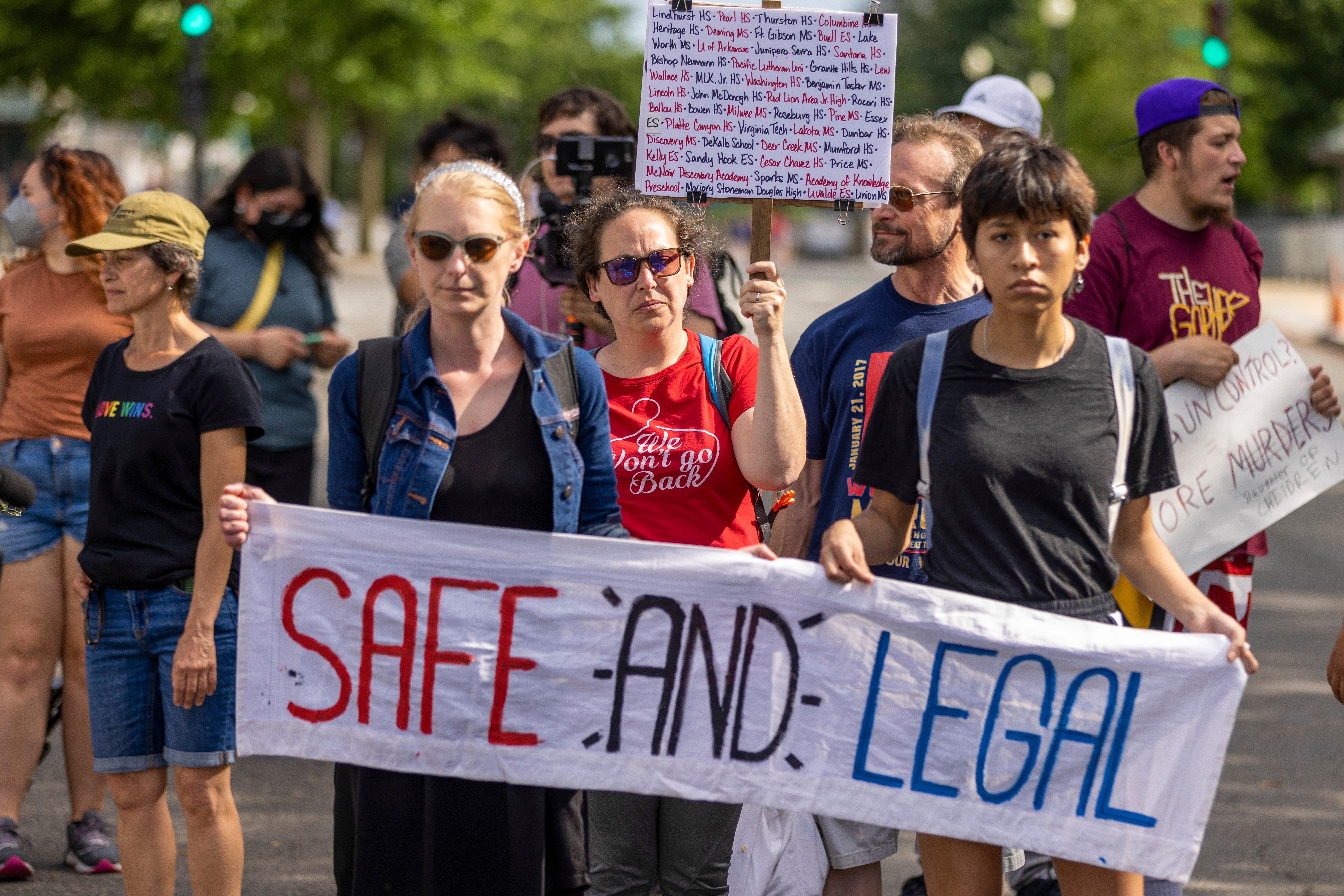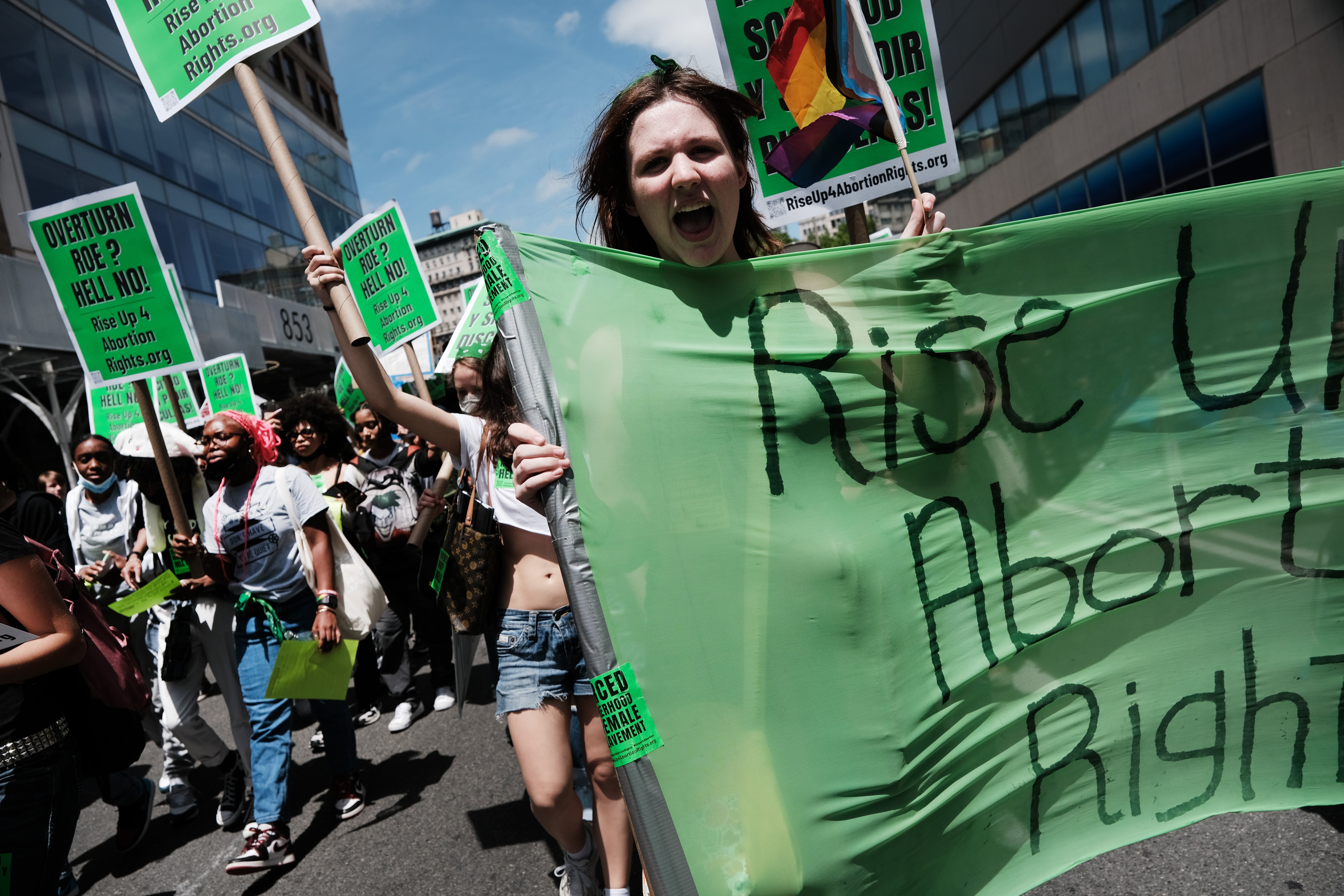Thousands of women condemned to lives of unnecessary poverty by overturning Roe, say experts
Economics largely absent from debate over scrapping of Roe but is critical, writes Andrew Buncombe


Many thousands of women and are being consigned to lives of poverty and economic hardship as a result of the scrapping of Roe and the ending of nationwide access to abortion, say experts. Their physical health is also likely to suffer.
The experts say studies show women who are denied abortions are almost four times more likely to fall below poverty level, than those who get one. They are are three times greater odds of being unemployed.
They also estimate an additional 75,000 women will give birth in the year after the overturning of Roe.
The experts say much of the debate over abortion and the ending of Roe after half-a-century has focused on constitutional law, civil rights and the power of Christian conservatives within the United States.
It has all but ignored the economic impact women will likely suffer, based on detailed studies carried out over a decade.
“If this were a just world we’d be so outraged about this it would would spark a political movement,” Dr Diana Greene Foster tells The Independent. “But there are so many egregious things happening right now that don’t seem to spark political change, so I don’t know.”:
She adds: “But we should know, that by not rising up against these laws, that we’re accepting that less advantaged people will be particularly harmed.”
Foster, a demographer and professor at the University of California San Francisco, is author of the Turnway Study, a 10-year piece of research that used credit scores and interviews with 1,000 women from 30 facilities in 21 states across the country.
Researchers compared the trajectories of the women who received a wanted abortion to those who were turned away, because they were past the facility’s gestational age limit.
The conclusions were staggering, says Foster. Women who were denied an abortion they sought were more likely to be more poor, along with their children; were likely to suffer worse health, and have lowered life aspirations, and also less likely to want to have another child later in life.
They also found that contrary to what is often said by supporters of banning abortions, that 95 per cent of women said it was the right decision for them.
Another myth exploded by the study, says Foster, was that abortion is dangerous. In fact, the research shows, there are no instances of women dying as a result of obtaining an abortion, whereas there are many reports of women dying as a result of being forced to give birth.
“Extremely consistent with medical literature, but not at all well understood by most people, carrying a pregnancy to term is much more dangerous than having an abortion, even an abortion later in pregnancy,” she says.
“It wasn’t just the end of the pregnancy that’s more dangerous. Women who are denied abortions reported worse health that lasts for years, so more hypertension and more likely to experience certain kinds of chronic pain.”

The study also found women turned away from getting an abortion were more likely to stay in contact with a violent partner. They were also more likely to raise the resulting child alone.
“When we asked people why did you want to have an abortion the leading reason is that they felt like they didn’t have the money to support a child or to support another child,” says Greene, who in 2020 published an expanded account of her findings The Turnaway Study: The Cost of Denying Women Access to Abortion.
“And so it shouldn’t be surprising that among the areas where we see the biggest differences between people who received and were denied their unwanted abortion is in economic well being.”
Foster and other experts say the many thousands of women could be impacted by the overturning of Roe, and that the poorest and already marginalised will suffer the most.
In Mississippi and other states such as Arkansas, which do not even provide exceptions in the case that a woman – even a teenage girl – is the victim of rape or incest, have insisted they have the resources to help women who will be forced to give birth. Already such states have some of the very worst childhood poverty in the nation, and whatever resources exist are overstretched.
When it appeared before the Supreme Court to defend its 15-week ban on abortion, the case that is Dobbs v. Jackson Women’s Health Organisation, Mississippi’s lawyers claimed much had changed since 1973, when Roe warned that an unwanted pregnancy could lead women to “a distressful life and future”.
“In these last 50 years women have carved their own ways to achieving a better balance for success in their professional and personal lives,” said its Attorney General, Lynn Fitch, a mother of three, from a wealthy background.
Her office said she did not have time to speak with The Independent.

She told the anti-abortion Eternal Word Television Network: “Think about this: the lives that will be touched, the babies that will be saved, the mothers that will get the chance to really redirect their lives.”
She added: “And they have all these opportunities that they didn’t have 50 years ago.”
Earlier this year, Mississippi governor Tate Reeves, a Christian fundamentalist who live-streamed prayer services from his office during the Covid pandemic, said more resources would need to be be provided for families, though he did not say where they would come from.
“We need to prove that being pro-life is about more than being anti-abortion,” he tweeted. “We need to commit more to the mission of supporting mothers and children. We need to continuously improve our foster care system. We need to make it easier to adopt a child. This is the mission now.”
In Arkansas, where one-in-five children live in poverty and its foster system has become overwhelmed, the Attorney General, Republican Leslie Rutledge, told PBS News, that people would be helped.
(Arkansas is also among 10 of the 13 states with trigger laws that make abortion illegal immediately, with no exceptions for rape or incest.)
She said children would receive “love” and “great educational opportunities”.
“I have worked in the foster care system. What those children need is our love. What they don’t need is someone putting a price tag on their life,” she added.
Greene and other experts say the many thousands of women could be impacted by the overturning of Roe, and that the poorest and already marginalised will suffer the most. They say, contrary to what Mississippi’s lawyers argued before the court, there is substantial evidence on the impact of women.
Caitlin Myers, a professor of economics at Middlebury College in Vermont, and a Research Fellow of the Institute for the Study of Labour, estimates that as a result of the overturn of Roe, about 100,000 women seeking abortions will be unable to reach a provider in the first year.
About 75,000 of them will give birth as a result, the difference in numbers being accounted for by women self-managing an abortion.
“For many people, the first issues that come to mind when they think about Roe and they think about constitutional protections for abortion, the first issues or ethical issues that have to do with personhood, when it begin, how to weigh the interests of a fetus against the interests of a mother, issues of constitutional law and balancing the federal government and state powers. They’re not really the realm of an economist,” says Myers.
Yet, she says there are fundamental economic issues at play. And they were actually raised by Mississippi’s legal team when it defended its ban, denying assertions made in Roe, and later in another ruling, Casey, that there was a “societal reliance” on abortion.
She says in fact it argued two seemingly contradictory points - that it was impossible to measure any economic impact on women, and that there was no impact - from being denied access to abortions.
Myers says the opposite is true, that there is evidence and it shows denying women access to abortions harms them economically.
“Let’s think about what the facts are here,” she adds.
“And economists have that evidence, and we know that legal abortion, and access to legal abortion, plays a fundamental role for women, and when in the planning of their lives, including their economic lives.”
Join our commenting forum
Join thought-provoking conversations, follow other Independent readers and see their replies
Comments
Bookmark popover
Removed from bookmarks